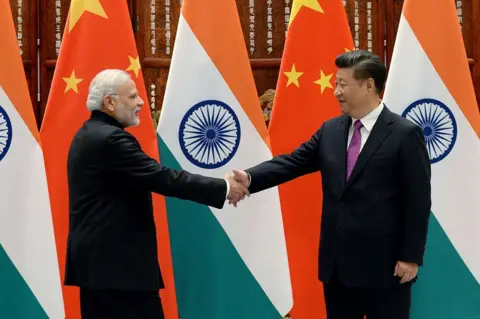In a poignant revelation, Vinay Gupta learned from his mother that his grandfather, Kundanlal, played a crucial role in assisting Jewish families escape the clutches of the Nazis. This discovery sparked Gupta's quest to document a little-known yet remarkable account of compassion and risk taken by an Indian businessman during one of history's darkest periods.
The story unfolds against the backdrop of World War II, where Kundanlal, originally from Ludhiana, India, leveraged his business acumen to help Jewish professionals obtain life-saving visas to India. Amidst increasing antisemitic violence in Europe, Kundanlal set up businesses aimed at employing Jews and providing them homes. However, as Britain entered the war, many Jews were declared "enemy aliens," complicating their attempts at refuge.
Kundanlal's journey began in a Vienna hospital, where he crossed paths with several Jewish families. Armed with the desire to help, he offered jobs linked to fictitious enterprises designed solely to secure exits from Nazi-occupied Austria. He successfully rescued five families, though their experiences post-arrival in India varied significantly.
Each narrative is unique; Fritz Weiss was one of the first to receive a job offer from Kundanlal while hiding from the Nazis. Alfred and Lucy Wachsler also benefitted from Kundanlal’s kindness, eventually relocating to India, where Alfred established a furniture workshop. Both families faced challenges adjusting to life in Ludhiana, and their stories reveal the struggles and hardships faced by those seeking refuge.
Gupta meticulously pieces together this history through letters, survivor interviews, and other historical documents, culminating in "A Rescue In Vienna," which details the extent of Kundanlal’s efforts. While the initial relief provided by Kundanlal eventually succumbed to the dire realities of war, his impact on those he helped was profound, and they carried memories of their time in India for years.
The plight of the Wachsler and Schafranek families shifted dramatically as wartime policies led to their internment—highlighting how narrowly they escaped the horrors of the Nazi regime. Their eventual release and relocation to different parts of the world illustrate the complex outcomes of Kundanlal's humanitarian efforts.
Though Kundanlal passed away in 1966, his legacy as a man of action and empathy persisted. His story stands as a testament to individual courage and compassion amidst systemic brutality, affirming that one person’s commitment to do what is right can change lives forever. Gupta's documentation not only honors this unsung hero but also underscores the importance of remembering these historical truths that bind communities across continents and generations.
The story unfolds against the backdrop of World War II, where Kundanlal, originally from Ludhiana, India, leveraged his business acumen to help Jewish professionals obtain life-saving visas to India. Amidst increasing antisemitic violence in Europe, Kundanlal set up businesses aimed at employing Jews and providing them homes. However, as Britain entered the war, many Jews were declared "enemy aliens," complicating their attempts at refuge.
Kundanlal's journey began in a Vienna hospital, where he crossed paths with several Jewish families. Armed with the desire to help, he offered jobs linked to fictitious enterprises designed solely to secure exits from Nazi-occupied Austria. He successfully rescued five families, though their experiences post-arrival in India varied significantly.
Each narrative is unique; Fritz Weiss was one of the first to receive a job offer from Kundanlal while hiding from the Nazis. Alfred and Lucy Wachsler also benefitted from Kundanlal’s kindness, eventually relocating to India, where Alfred established a furniture workshop. Both families faced challenges adjusting to life in Ludhiana, and their stories reveal the struggles and hardships faced by those seeking refuge.
Gupta meticulously pieces together this history through letters, survivor interviews, and other historical documents, culminating in "A Rescue In Vienna," which details the extent of Kundanlal’s efforts. While the initial relief provided by Kundanlal eventually succumbed to the dire realities of war, his impact on those he helped was profound, and they carried memories of their time in India for years.
The plight of the Wachsler and Schafranek families shifted dramatically as wartime policies led to their internment—highlighting how narrowly they escaped the horrors of the Nazi regime. Their eventual release and relocation to different parts of the world illustrate the complex outcomes of Kundanlal's humanitarian efforts.
Though Kundanlal passed away in 1966, his legacy as a man of action and empathy persisted. His story stands as a testament to individual courage and compassion amidst systemic brutality, affirming that one person’s commitment to do what is right can change lives forever. Gupta's documentation not only honors this unsung hero but also underscores the importance of remembering these historical truths that bind communities across continents and generations.





















